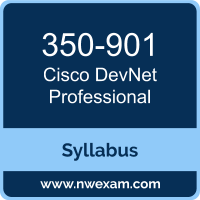 A great way to start the Cisco Certified DevNet Specialist - Core (DEVCOR) preparation is to begin by properly appreciating the role that syllabus and study guide play in the Cisco 350-901 certification exam. This study guide is an instrument to get you on the same page with Cisco and understand the nature of the Cisco DevNet Professional exam.
A great way to start the Cisco Certified DevNet Specialist - Core (DEVCOR) preparation is to begin by properly appreciating the role that syllabus and study guide play in the Cisco 350-901 certification exam. This study guide is an instrument to get you on the same page with Cisco and understand the nature of the Cisco DevNet Professional exam.
Our team of experts has composed this Cisco 350-901 exam preparation guide to provide the overview about Developing Applications Using Cisco Core Platforms and APIs exam, study material, sample questions, practice exam and ways to interpret the exam objectives to help you assess your readiness for the Cisco DEVCOR exam by identifying prerequisite areas of knowledge. We recommend you to refer the simulation questions and practice test listed in this guide to determine what type of questions will be asked and the level of difficulty that could be tested in the Cisco DevNet Professional certification exam.
Cisco 350-901 Exam Overview:
| Exam Name | Developing Applications Using Cisco Core Platforms and APIs |
| Exam Number | 350-901 DEVCOR |
| Exam Price | $400 USD |
| Duration | 120 minutes |
| Number of Questions | 90-110 |
| Passing Score | Variable (750-850 / 1000 Approx.) |
| Recommended Training |
Developing Applications Using Cisco Core Platforms and APIs | DEVCOR Developing Applications Using Cisco Core Platforms and APIs 2.0 Developing Applications using Cisco Core Platforms and APIs (DEVCOR) v2.0 |
| Exam Registration | PEARSON VUE |
| Sample Questions | Cisco 350-901 Sample Questions |
| Practice Exam | Cisco Certified DevNet Specialist - Core Practice Test |
Cisco 350-901 Exam Topics:
| Section | Weight | Objectives |
|---|---|---|
| Software Development and Design | 20% |
- Describe distributed applications related to the concepts of front-end, back-end, and load balancing - Evaluate an application design considering scalability and modularity - Evaluate an application design considering high-availability and resiliency (including on-premises, hybrid, and cloud) - Evaluate an application design considering latency and rate limiting - Evaluate an application design and implementation considering maintainability - Evaluate an application design and implementation considering observability - Diagnose problems with an application given logs related to an event - Evaluate choice of database types with respect to application requirements (such as relational, document, graph, columnar, and Time Series) - Explain architectural patterns (monolithic, services oriented, microservices, and event driven) - Utilize advanced version control operations with Git
- Explain the concepts of release packaging and dependency management |
| Using APIs | 20% |
- Implement robust REST API error handling for time outs and rate limits - Implement control flow of consumer code for unrecoverable REST API errors - Identify ways to optimize API usage through HTTP cache controls - Construct an application that consumes a REST API that supports pagination - Describe the steps in the OAuth2 three-legged authorization code grant flow |
| Cisco Platforms | 20% |
- Construct API requests to implement chatops with Webex API - Construct API requests to create and delete objects using Firepower device management (FDM) - Construct API requests using the Meraki platform to accomplish these tasks
- Construct API calls to retrieve data from Intersight |
| Application Deployment and Security | 20% |
- Diagnose a CI/CD pipeline failure (such as missing dependency, incompatible versions of components, and failed tests) - Integrate an application into a prebuilt CD environment leveraging Docker and Kubernetes - Describe the benefits of continuous testing and static code analysis in a CI pipeline - Utilize Docker to containerize an application - Describe the tenets of the "12-factor app" - Describe an effective logging strategy for an application - Explain data privacy concerns related to storage and transmission of data - Identify the secret storage approach relevant to a given scenario - Configure application specific SSL certificates - Implement mitigation strategies for OWASP threats (such as XSS, CSRF, and SQL injection) - Describe how end-to-end encryption principles apply to APIs |
| Infrastructure and Automation | 20% |
- Explain considerations of model-driven telemetry (including data consumption and data storage) - Utilize RESTCONF to configure a network device including interfaces, static routes, and VLANs (IOS XE only) - Construct a workflow to configure network parameters with:
- Identify a configuration management solution to achieve technical and business requirements |
Cisco DEVCOR Exam Description:
Developing Applications using Cisco Core Platforms and APIs v1.1 (DEVCOR 350-901) is a 120-minute exam associated with the DevNet Professional Certification. This exam certifies a candidate's knowledge of software development and design including using APIs, Cisco platforms, application deployment and security, and infrastructure and automation. The course, Developing Applications using Cisco Core Platforms and APIs helps candidates to prepare for this exam.
